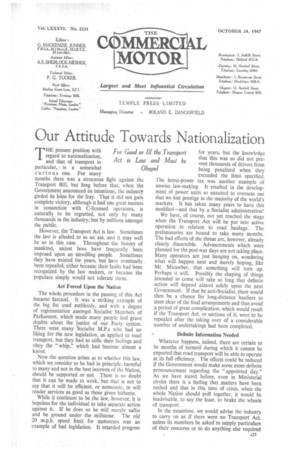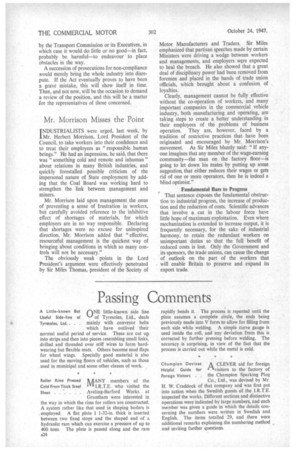Our Attitude Towards Nationalization
Page 25

Page 26

If you've noticed an error in this article please click here to report it so we can fix it.
For Good or Ill the Transport Act is Law and Must be Obeyed
THE present position with regard to nationalization, and that of transport in particular, is a somewhat curious one. For many months there was a strenuous fight against the Transport Bill, but long before that, when the Government announced its intentions, the industry girded its loins for the fray. That it did not gain complete victory, although it had one great success in connection with C-licensed operators, is naturally to be regretted, not only by many thousands in the industry, but by millions amongst the public.
However, the Transport Act is law. Sometimes the law is alluded to as an ass, and it may well be so in this case. Throughout the history of mankind, unjust laws have frequently been imposed upon an unwilling people. Sometimes they have existed for years, but have eventually been repealed, either because their faults had been recognized by the law makers, or because the populace simply would not tolerate them.
Act Forced Upon the Nation The whole procedure in the passing of this Act became farcical. It was a• striking example of the big fist used ruthlessly, and with a degree of regitnentation amongst Socialist Members of Parliament, which made many people feel grave doubts about the justice of our Party system. There were many Socialist M.P.s who had no liking for the new legislation, as applied to road transport, but they had to stifle their feelings and obey the "whip," which had become almost a knout.
Now the question arises as to whether this law, which we consider to be bad in principle, harmful to many and not in the best interests of the Nation, should be supported or not. There is no doubt that it can be made to work, but that is not to say that it will be efficient, or economic, or will render services as good as those given hitherto.
While it continues to be the law, however, it is hopeless for the individual to take separate action against it. If he does so he will merely suffer and be ground under the millstone. The old 20 m.p.h. speed limit for motorcars was an example of bad legislation. It retarded progress for years, but the knowledge that this was so did not prevent thousands of drivers from being penalized when they exceeded the limit specified. The horse-power tax was another example of unwise law-making. It resulted in the development of power units so unsuited to overseas use that we lost prestige in the majority of the world's markets. It has taken many years to have this modified—and that by a Socialist administration!
We have, of course, not yet reached the stage when the Transport Act will be put into active operation in relation to road haulage. The preliminaries are bound to take many months. The bad effects of the threat are, however, already clearly discernible. Advancements which were planned for the post-war days are not taking place. Many operators are just hanging on, wondering what will happen next and merely hoping, like Mr. Micawber, that something will turn up. Perhaps it will. Possibly the shaping of things intended to come will take so long that definite action will depend almost solely upon the next Government. If that be anti-Socialist, there would then be a chance for long-distance hauliers to steer clear of the final arrangements and thus avoid a period of great complication, which would result if the Transport Act, or sections of it, were to be repealed after the taking over of a considerable number of undertakings had been completed.
Definite Information Needed Whatever happens, indeed, there are certain to be months of turmoil during which it cannot be expected that road transport will be able to operate at its full efficiency. The effects could be reduced if the Government would make some more definite pronouncement regarding the "appointed day." As we have stated before, even in Ministerial circles there is a feeling that matters have been rushed and that in this time of crisis, when the whole Nation should pull together, it would be inadvisable, to say the least, to brake the wheels of transport.
In the meantime. we would advise the industry to carry on as if there were no Transport Act, unless its members be asked to supply particulars of their concerns or to do anything else required by the Transport Commission or its Executives, in which case it would do little or no good—in fact, probably be harmful—to endeavour to place obstacles in the way.
A succession of prosecutions for non-compliance would merely bring the whole industry into disrepute. If the Act eventually proves to have been a grave mistake, this will show itself in time. Then, and not now, will be the occasion to demand a review of the position, and this will be a matter for the representatives of those concerned.
Mr. Morrison Misses the Point
INDUSTRIAL1STS were urged, last week, by Mr. Herbert Morrison, Lord President of the Council, to take workers into their confidence and to treat their employees as "responsible human beings." He had an impression, he said, that there was "something cold and remote and inhuman" about relations in many British industries, and quickly forestalled possible criticism of the impersonal nature of State employment by adding that the Coal Board was working hard to strengthen the link between management and miners.
Mr. Morrison laid upon management the onus of preventing a sense of frustration in workers, but carefully avoided reference to the inhibitive effect of shortages of materials, for which employers are in no way responsible. Declaring that shortages were no excuse for uninspired direction, Mr. Morrison added that "effective, resourceful management is the quickest way of bringing about conditions in which so many controls will not be necessary."
The obviously weak points in the Lord President's argument were effectively penetrated by Sir Miles Thomas, president of the Society of Motor Manufacturers and Traders. Sir Miles emphasized that partisan speeches made by certain Ministers were driving a wedge between workers and managements, and employers were expected to heal the breach. He also showed that a great deal of disciplinary power had been removed from foremen and placed in the hands of trade union officials, which brought about a confusion of loyalties. Clearly, management cannot be fully effective without the co-operation of workers, and many important companies in the commercial vehicle industry, both manufacturing and operating, are taking steps to create a better understanding in their employees of the problems of business operation. They are, however, faced by a tradition of restrictive practices that have been originated and encouraged by Mr. Morrison's movement. As Sir Miles bluntly said: "If anyone imagines that any member of the wage-earning community—the man on the factory floor—is going to let down his mates by putting up some suggestion, that either reduces their wages or gets rid of one or more operators, then he is indeed a blind optimist."
Fundamental Bars to Progress That sentence exposes the fundamental obstruction to industrial progress, the increase of production and the reduction of costs. Scientific advances that involve a cut in the labour force have little hope of maximum exploitation. Even where mechanization is extended to increase output, it is frequently necessary, for the sake of industrial harmony, to retain the redundant workers on unimportant duties so that the full benefit of reduced costs is lost. Only the Government and its sponsors, the trade unions, can cause the change of outlook on the part of the workers that will enable Britain to preserve and expand its export trade.
















































































